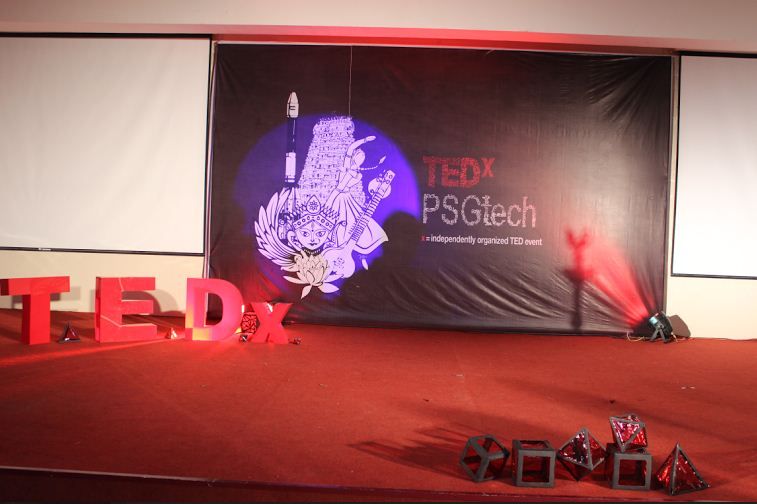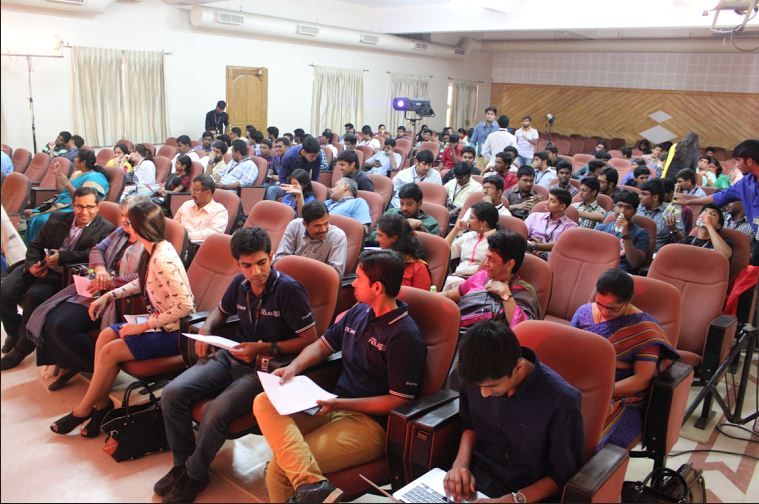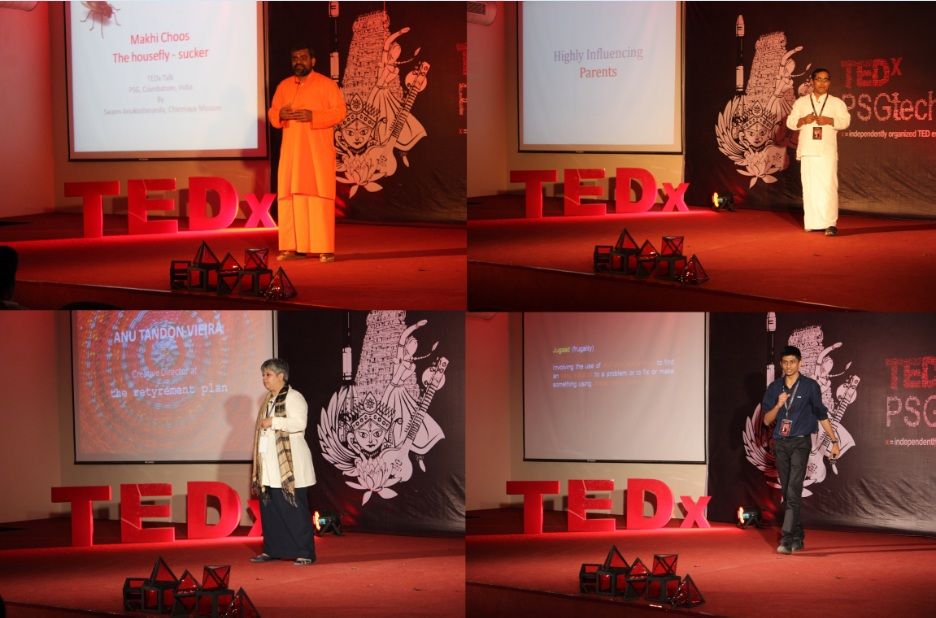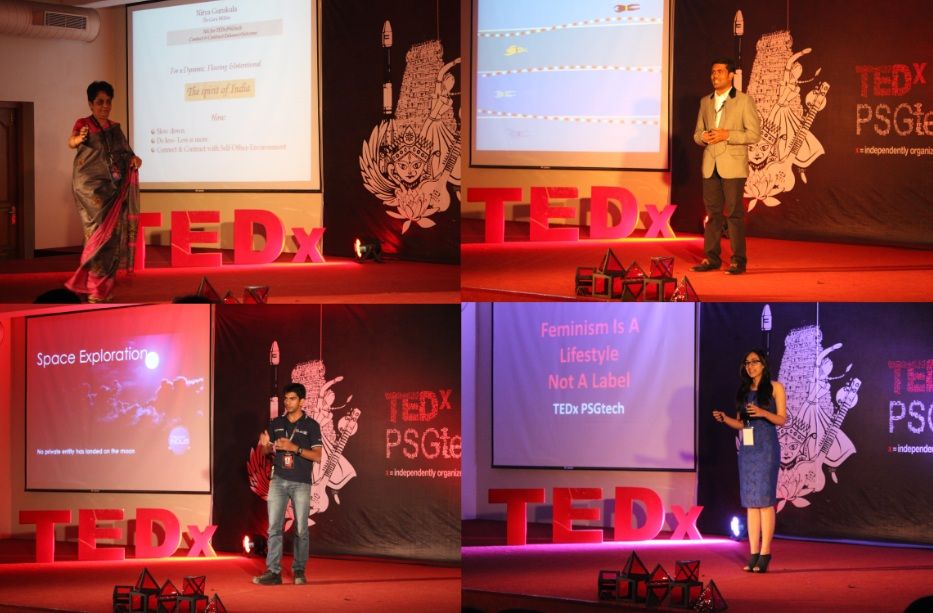TEDxPSGTech: A Festival of Minds!

TEDx has a great reputation of bringing great minds together. In what could be called an experiment of one of its kind, TEDxPSGTech succeeded by a very good margin. Bringing in speakers of extreme choices and with a variety of flavors in a bowl, this event manifested into an inspirational, thought – provoking, and certainly a very enjoyable one.
TEDxPSGtech witnessed people from every walk of life coming in huge numbers and participating. The organizers of the event managed the event with zero to very little delays and were amply supported by the Global Leaders Forum (GLF). Here are the excerpts from the various talks that took place at TEDxPSGtech:
1) Reuben Fernandes:
Where many of us dream and just dream, whilst complaining the lack of facilities, an SRM Mechatronics graduate matured up to be a part of Team Indus, one of the top three teams in the world as ranked by NASA. He knew better that he wanted to do more than just a mediocre job, when he joined the Team Indus, headed by Rahul Narayanan. While many advised against his decision, he had the spirit and the guts to believe his passion and follow it. Team Indus happened when Rahul decided that there should be an Indian team also taking part in the revolution started by Google with the name ‘Lunar 2.0 challenge’ (or) the ‘Lunar X challenge’. The challenge statement was simple: ‘Maneuver a rover to the moon, travel 500 m and return to earth’.
We are talking rocket science here and the worst part is that they should be 90% privately funded. Realizing that ‘the greatest danger is to play it safe’, he quit his job and entered Team Indus. This team of young, talented people worked hard and proved the world their potential by winning $1 million USD for the milestone challenge,when they proved that their model could actually land on the moon. One may ask, “A bunch of kids trying to take a robot to the moon, so what?” Most of the other international team had access to cutting end technologies, but Team Indus with all the limited resources proved their mettle by accomplishing the challenge. Reuben, showing the utmost trace of humbleness, had made this point very clear in the talk.
2) Mohit Singhala:
Here, we have our own PSG Techian – Mohit Singhala (BE – Mechanical, 2012-2016) as the speaker for the TEDxPSGtech. In other countries, scientists of various backgrounds invent something new. But, what about India? A farmer, a salesman, a clerk, a policeman, all the way to students innovate and invent something new in their daily lives. These quick, small hacks serve the purpose in their lives. It is widely held that India lacks in invention, but nothing could be said about the innovation that flows through everyone here. This ‘Jugaad’ could be a key and lead to inventions.
Leading a life of an innovator, he is largely left amused by the foreign inventions that are too costlier than they should be, yet lacking certain efficiency, which also could have been developed for a lesser price. Stating a few of his innovations as examples, he insists that these clever hacks have benefited him a lot and he is also sure that it would lead to higher productivity. He finishes his talk with an exhilarating thought that “We should not make things, but create things.”

3) Veda Nadendla:
There came Veda Nadendla with a resolution to clear up all the convolutions surrounding the idea of Feminism and to explain what Feminism really is. An open minded, bold speaker, Veda has everything in her blood that one would need, to stand up against any kind of injustice against women. In a society filled with extremism in everything, including chauvinism, she had enough with the gender based discrimination that girls face in their day-to-day life.
When someone asked ‘why be a feminist instead of a humanist’, she begged their pardon. She can’t believe the fact that when someone fights for their forgotten rights, they are deemed extremists, while all they ask for is mutual respect and equal rights. Proving that the mightiest is the one who can rise up even from the deadliest pit, her life started when she understood that she is not to be blamed for something that happened without her consent. She feels that unless we all, irrespective of our gender, stand up against any discrimination and loss of human rights, we can’t forge a society where everyone is respected and the opportunities are not snatched away in the name of discrimination.

5) Gopal Krishnan:
Anomalies indeed make any presentation’s start interesting. But Gopal Krishnan, walking in with his hands cuffed together, raised the bar to a whole new level signifying that the stereotypes installed by the British before independence still cloud our thinking and creating process. And, this is one serious issue which was stressed in the talk. He represented his team “MyPromoVideos” in this event. They are one of the innovative visual marketing team, who can make you buy things you would never use in your life – especially after the advance of e-marketing.
He went on about the importance of fusion of marketing, innovation and design for a product and its success, quoting the very well established and unquestionable Steve Jobs’ strategy. His team used this technique to bring about good social causes like the one promo they made to spread awareness and distill myths about menstruation. He demonstrated the power of great ads which acted as the turning point for many a company’s business. He proved that everyone is certainly under the constant spell of a visual marketing person.

6) Swami Anukoolanda:
Has anyone heard of ‘MakkhiChoos’? He calls a ‘worst miser’ that. ‘MakkhiChoos’ literally means “Housefly sucker”. What’s that got to do with a miser? As he says, a MakkhiChoos is a top class miser that he won’t drink a drop from a honey pot, but won’t even leave a housefly, which drinks it. That’s the extreme case. But, there is a little miser in everyone of us; only the percentage composition varies slightly. Interestingly, according to a study, the world’s 80% of riches is owned by 20% of the population, and the rest have the remaining 20%. As Gandhi says, “It is possible to feed a nation’s hunger, but not a person’s greed”. He highlighted that there is no poverty, but only disparity.
Swami Anukoolanda uses a 2x2 matrix to illustrate four walks of life: Get-Get type, Give-Get type, Get-Give type and the Give – Give type. The happiness level also follows the same order. The largest culprit ‘Insecurity’ is accused to be responsible for all the mishaps happening, which follows the sense of incompleteness. Had it not been for the feeling of insecurity, Macbeth would not have murdered his king, holy wars would have ceased to exist, terrorism would not have taken a root in the history of humans. He concluded his talk by showing a slide of Winnie the pooh, asking us to taste the nectar rather than being a miser.
7) Anu Tandon Viera:
Even a human’s expelled air has around 16% Oxygen in it, which would be enough to save an unconscious individual. The waste acquired while harvesting crops, serves as a fodder for cattle. In every waste lies an opportunity, hidden by a silver lining. We term something as a Wasteland and isolate it from the rest of the world. It stays there indefinitely until someone finds a way to use it for himself. These people know exactly how to find a key to the locked door, rather than crying in front of it. There lies an unmeasured potential in the so-called waste and that transfers to those who tap it first, because the only difference they make is how they see it.
8) Sivakumar Palaniappan:
So much buzz surrounds the “parenting “ section nowadays – books, TV shows, tutorials and even workshops! Every parent wants to make their child the best in everything. But, does this really work? Let’s sit back and take time to have a look at it. The recent, dangerous trend shows that the parents want their children to push harder to achieve the most. But, all this, for what? Ultimately, the social status. But, does a child really deserve or need such a thing?
When they can no longer take it, they fail and when they do, they fail hard. Such a thing has very less recovery rate. Out of love and compassion, they want their children to be risk averse, both in their life and career. But, the problem is that it makes them fear failure rather than facing life courageously. For example, academic excellence is celebrated as a success while lesser marks mean a disgrace. Does this really make any sense? Then, what can one do to correctly raise children? The answer is simple – Nothing. The speaker encourages the parents to interact with their children, know them, and then, plan their life accordingly to bring about a brighter future. Because, Career and Knowledge start when you parent by yourselves.




